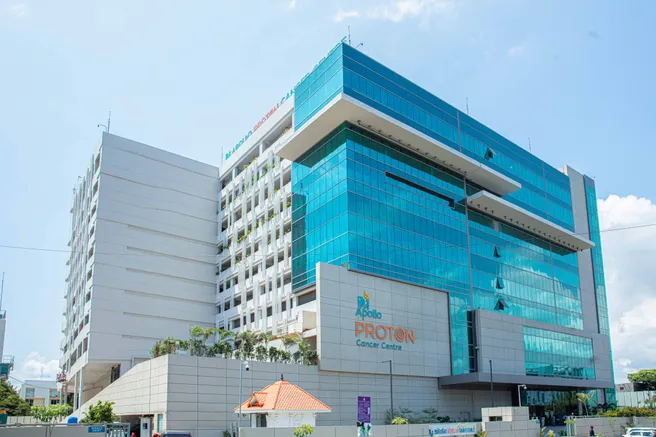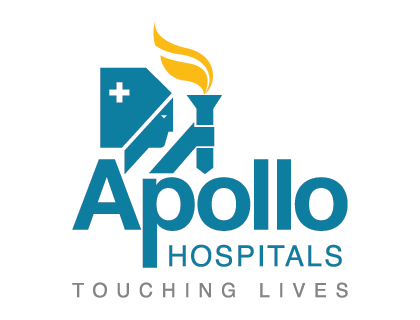This article delves into:
1. Understanding Proton Therapy, A Form of Radiation Therapy
2. Comparison: X-Ray Radiation vs. Proton Therapy
3. Advantages of Proton Therapy
4. Apollo Proton Cancer Centre (APCC)-Best Cancer Hospital in India
5. Who is a Candidate for Proton Therapy? Determining Eligibility
6. Frequently Asked Questions (FAQs) About Proton Therapy
Fighting Cancer with Precision: Is Proton Therapy Right for You?
In 2022, 20 million new cancer cases were diagnosed globally. While traditional radiation therapy has been a mainstay in cancer treatment, advancements in technology are offering new options.
Proton therapy is a cutting-edge form of radiation treatment that utilises high-energy protons to precisely target cancer cells.
Unlike traditional X-ray radiation, which can damage surrounding healthy tissue, proton therapy delivers a more focused dose
Statistics show promise: Studies indicate that proton therapy can potentially reduce side effects for patients compared to traditional radiation.
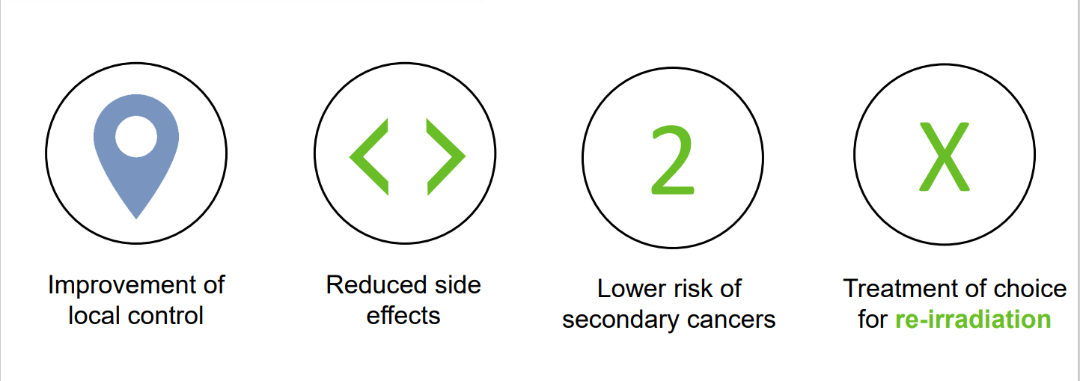
As a leading provider of proton therapy in India, Apollo Proton Cancer Centre in Chennai is committed to offering patients access to this advanced cancer treatment.
Throughout this blog, we'll see how proton therapy works, its benefits, and who might be a suitable candidate.
Learn More About Proton Therapy at Apollo Proton Cancer Centre, 1st of its kind in South Asia and the Middle East!
Understanding Proton Therapy, A Form of Radiation Therapy
Imagine tiny, positively charged particles called protons speeding towards a target. These protons act as soldiers in the fight against cancer.
How Proton Therapy Works
1. Imaging & Planning: Doctors use advanced scans to create a 3D map of your tumour and surrounding tissues. This map helps them precisely target the proton beam.
2. Proton Beam Delivery: You lie comfortably on a table while a machine called a gantry rotates around you.
The gantry houses the equipment that guides the protons towards the tumour location with incredible accuracy. The proton therapy process is painless
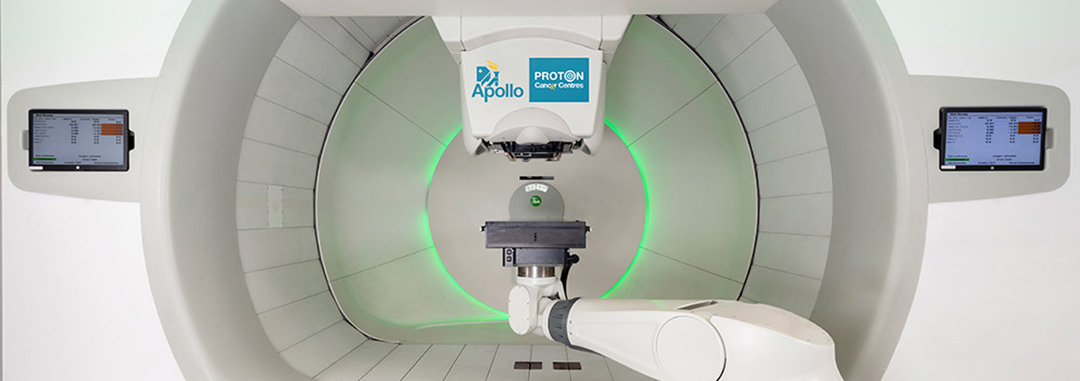
3. Destroying Cancer Cells: When protons reach the tumour, they release their energy, killing cancer cells and causing the least amount of harm to surrounding healthy tissues.
Do you have questions about proton therapy?
Comparison: X-Ray Radiation vs. Proton Therapy
Both traditional radiation and proton therapy utilise radiation to fight cancer, but they differ in their delivery methods.
Here's a table summarising the key differences:
Feature | X-Ray Radiation | Proton Therapy |
Radiation Type | X-rays | Protons |
Targeting | Broad beam | Focused beam targets only the tumor |
Impact on Tissue | Can damage surrounding tissue | Minimises damage to healthy tissue |
Side Effects | Higher risk of fatigue, nausea | Lower risk of side effects |
Applications | Effective for many cancers | Beneficial for cancers near critical organs or sensitive areas |
While X-ray radiation offers a proven approach, proton therapy's targeted delivery leads to a better quality of life during and after treatment.
Advantages of Proton Therapy for Cancer Treatment
1. Precise Targeting
a) Reduced Side Effects
Fewer side effects like fatigue, nausea, and skin irritation are experienced less with proton therapy compared to traditional radiation.
Read: 5 Cancers That are Best Treated with Proton Therapy
b) Better Long-Term Outcomes
Sparing healthy tissue leads to improved long-term outcomes, especially near critical organs or sensitive areas like the brain, heart, or spinal cord.
2. Fewer Complications
By minimising damage to healthy tissue, it can reduce the risk of developing secondary complications.
This can include issues like:
a) Scarring: Damage to healthy tissue can lead to scar tissue formation, which can affect organ function or mobility.
b) Secondary Cancers: In rare cases, traditional radiation therapy can increase the risk of developing a new cancer in the irradiated area.
3. Enhanced Accuracy with Active Scanning
Proton therapy utilises a sophisticated technique called active scanning.
During treatment, a beam of protons is precisely steered across the tumour volume, one layer at a time.
This allows doctors to:
a) Conform the Dose: Tailor the radiation dose to the exact shape of the tumour.
b) Treat Complex Tumours: Effectively treat tumours with irregular shapes or those that move with respiration (breathing).
c) Reduce Integral Dose: Minimise the amount of radiation delivered to patient, leading to fewer side effects and long-term health outcomes.
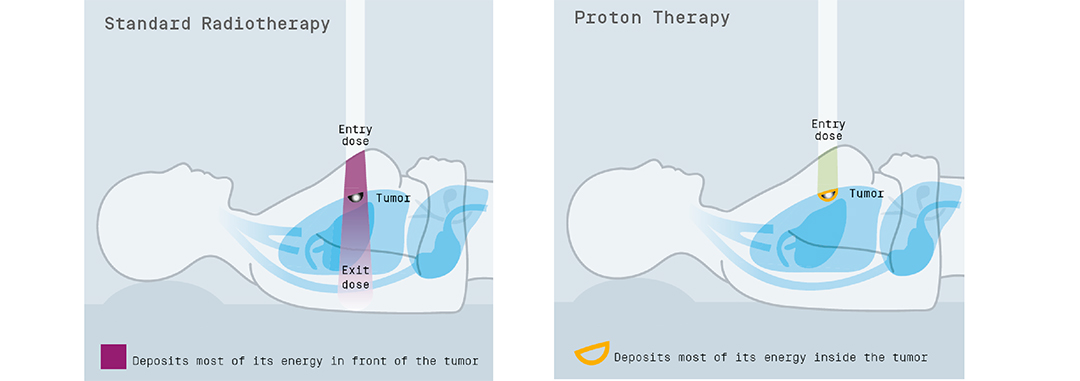
Offering these advantages, proton therapy can improve treatment outcomes and cancer patients' quality of life.
Why Choose Apollo Proton Cancer Centre (APCC) for Cancer Treatment?
1. State-of-the-art Equipment
It boasts cutting-edge technology, including the 1st Proton Therapy in South Asia and Middle East.
2. Experienced Team
APCC is led by a team of highly qualified oncologists, physicists, and therapists specialising in proton therapy.
Their expertise ensures patients receive the most advanced and personalised treatment plans.

3. Global Recognition
APCC is India's 1st JCI-Accredited Cancer Hospital, demonstrating its commitment to the highest international quality standards.
4. Proven Success
With 1200+ patients (both adults and children) treated in the past few years, APCC has a successful track record of helping individuals fight cancer.
5. Personalised Care
Dedicated Cancer Management Teams (CMTs) create individualised treatment plans based on each patient's unique condition.
6. Holistic Treatment
As part of the Apollo Hospitals network, APCC offers an integrated approach.
Apollo Hospital offers patients a combination of proton therapy, surgery, medical oncology, and other cancer treatment options.
7. International Patient Support
Understanding the challenges of seeking treatment abroad, APCC offers a dedicated international patient services team.
This team provides assistance with visa applications, travel logistics, and language support.
Who is a Candidate for Proton Therapy? Determining Eligibility
While proton therapy offers exciting possibilities, it's important to understand if it's the right fit for your specific case.
Several factors influence whether it is the most suitable option including:
Tumour Location: Proton therapy is beneficial for tumours located near critical organs or sensitive areas.
Tumour Size: The size and shape of the tumour can influence treatment decisions.
Overall Health: Your overall health and ability to tolerate treatment are also important considerations.
Every patient's situation is unique. Apollo Proton Cancer Centre's oncologist will evaluate your specific case and provide personalised guidance.
They will assess your medical history, perform tests, and discuss with you the potential benefits and drawbacks of proton therapy compared to other treatment options.

Not sure if proton therapy is right for you? Get a personalised evaluation from APCC!
Always consult with your doctor to determine the most appropriate treatment plan for you.
Frequently Asked Questions (FAQs) About Proton Therapy
1. Availability and Cost
I've heard about proton therapy, but is it widely available? What is the cost of proton therapy compared to traditional radiation?
Proton therapy is a rapidly growing field, but it's true that it's not yet available at every treatment centre.
Apollo Proton Cancer Centre (APCC) - India, is proud to be at the forefront of this technology.
While the cost of proton therapy can be higher compared to traditional radiation, it's important to consider the potential long-term benefits.
Reduced treatment times, fewer side effects, and potentially improved health outcomes can impact your overall well-being and potentially reduce future healthcare costs.
2. Treatment Duration
How long will proton therapy treatment last?
The duration of proton therapy treatment varies depending on the individual case.
A treatment plan will be influenced by the type and size of your tumour and your overall health.
During your consultation at APCC, doctors will create a personalised treatment schedule that outlines the expected duration.
In some cases, proton therapy can offer shorter treatment times compared to traditional radiation therapy.
3. What to Expect After Reaching APCC
What happens if I choose to receive treatment at APCC? What should I expect?
APCC's priority is to create a supportive and patient-centred environment to ease the burden of a cancer diagnosis.
A My 1Health patient support specialist will guide you through from the initial contact, including visa assistance and travel logistics for international patients.
Upon arrival, a team of doctors, nurses, and therapists will collaborate with you to develop a treatment plan and ensure your comfort throughout the process.

Learn more about Apollo Proton Cancer Centre (APCC) in Chennai.
4. Side Effects
What are the potential side effects of proton therapy?
Proton therapy is known for its ability to minimise side effects compared to traditional radiation, as it delivers radiation doses directly to the tumour.
Potential side effects can vary depending on the treated area, but they are often milder and less frequent compared to traditional radiation therapy.
The team at APCC will discuss the potential side effects with you in detail and provide guidance on managing any discomfort you may experience.
5. Success Rates
What are the success rates of proton therapy?
Success rates for proton therapy depend on factors such as the type and stage of the cancer being treated.
Ongoing research continues to validate the effectiveness of proton therapy for various cancers. APCC encourages you to discuss your specific case with their doctors.
Remember:
This blog is for informational purposes and should not be a substitute for professional medical advice.
